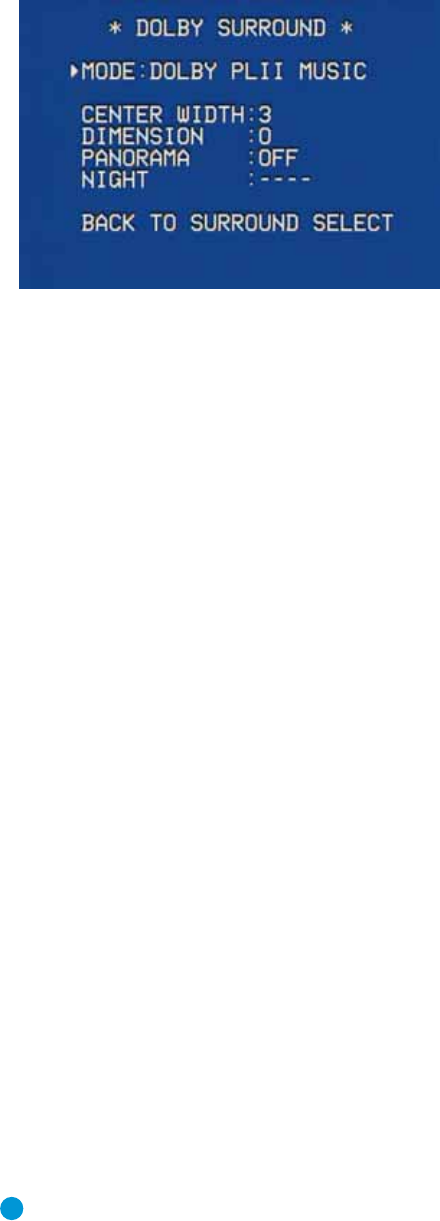
42
ADVANCED FUNCTIONS
Dolby Surround Settings
In addition to the MODE line, the DOLBY SURROUND submenu includes
three settings that are active only when the Dolby Pro Logic II Music
mode has been selected. See Figure 72.
Figure 72 – Dolby Surround Menu Screen
CENTER WIDTH: This setting affects how vocals sound through the
three front speakers. A higher number (up to 7) focuses the vocal
information tightly on the center channel. Lower numbers broaden
the vocal soundstage across the three speakers.
DIMENSION: This setting affects the depth of the surround presentation,
allowing you to “move” the sound toward the front or rear of the room.
The setting of “0” is a neutral default. Setting “F-3” moves the sound
mostly toward the front of the room, while setting “R-3” moves the
sound mostly toward the rear.
PANORAMA: With the Panorama mode turned ON, some of the sound
from the front speakers is moved to the surround speakers, creating an
enveloping “wraparound” type of effect.
NIGHT MODE: Night mode is available with some Dolby Digital
programs, if it has been encoded in the material. It compresses the
peak sound levels, maintaining the intelligibility of the dialogue and
quieter passages, while reducing the loudness of special effects and
louder passages to avoid disturbing others. Three levels of compression
are available:
OFF: At this setting, there is no compression, as the Night mode
is deactivated.
MID: A mild compression is applied.
MAX: More compression is applied.
We suggest that you experiment with the modes to find a setting that
meets your needs.
The Night mode may also be adjusted without using the full-OSD
menu system. With a Dolby Digital program encoded with Night mode
playing, press the Night Button on the remote. Each press of the button
will cycle through the three settings, with the selected setting being
displayed on the front panel and in the semi-OSD display.
UPSAMPLING: The last line of the Surround Select menu activates
upsampling, only available with the Dolby Pro Logic II Movie, Dolby
Pro Logic II Music and Dolby Pro Logic modes. Normally set to OFF,
upsampling, when activated, processes digital sources at a higher
resolution for improved sound quality.This feature can be useful to
eliminate distortion in some low-resolution sources.
Default Modes
During initial use or after a processor reset, the AVR 146 will default
to the Logic 7 Music mode for all analog and PCM audio inputs.
Subsequently, when a source input is selected and an analog or PCM
signal is received, the AVR will switch to the last surround mode used
for that source input/incoming signal combination.
Whenever a multichannel Dolby Digital or DTS signal is detected, the
AVR 146 will automatically switch to that mode, unless the DEFAULT SURR
MODE setting in the System Setup menu has been changed to OFF. Table 5
reflects that other surround modes are available for use with the multichannel
digital bitstreams. If you would prefer the AVR 146 to use one of those
alternate modes any time the same digital signal is detected, then select
that mode while the multichannel bitstream is present, and then change the
DEFAULT SURR MODE setting in the System Setup menu to OFF.
Table 5 provides descriptions of all surround modes available on the
AVR 146, along with the incoming bitstreams or signals that the particular
mode may be used with. Feel free to experiment and simply cycle through
all of the available modes at any time; you cannot cause any problems for
the AVR 146 by doing so.
AVR146-OM.qxd 2/5/07 3:59 PM Page 42


















